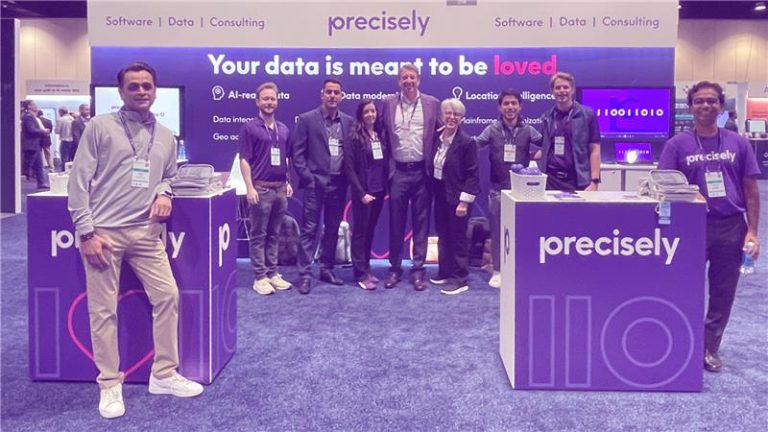
Insights from the Gartner Data & Analytics Summit in London: Embracing Data Leadership and Strategy

The Precisely team recently had the privilege of hosting a luncheon at the Gartner Data & Analytics Summit in London. It was an engaging gathering of industry leaders from various sectors, who exchanged valuable insights into crucial aspects of data governance, strategy, and innovation.
Sanjeev Mohan, former Gartner analyst and principal at SanjMo, served as moderator for the luncheon. His key takeaways from the conversation were that “data leaders are under tremendous pressure to collaborate within the C-Suite on projects that deliver true business value. They are working through organizational design challenges while also establishing foundational data management capabilities like metadata management and data governance that will allow them to offer trusted data to the business in a timely and efficient manner for analytics and AI.”

Explore the key topics and insights from this event below, and get inspired to apply these takeaways for success in your own data-driven journey.
1. The Role of the Chief Data and Analytics Officer (CDAO)
One major theme was the evolving role of the CDAO and the positioning of data teams within organizations.
A data leader from one insurance company emphasized the importance of elevating data leaders to be business leaders, advocating for their inclusion in the C-Suite. This sentiment was echoed by others, highlighting the need for data teams to be strategically positioned within the business rather than only within IT.
2. Developing Robust Data Strategies
Attendees discussed the extensive efforts being put into developing comprehensive data strategies – including the need to create clear operating models for AI governance. On this topic, one manufacturing sector data leader highlighted the need for well-defined responsibilities, competencies, and authority models.
AI practices need to comply with global regulations, and conversations centered around the importance of having clear principles for both providers and users of AI to make that possible.
3. Metadata Management and Data Governance
The topics of metadata management and data governance are gaining momentum far and wide, and that was clear within our group of industry leaders.
The concept of federated data governance sparked vigorous discussion. Some felt they weren’t quite ready to take on governance of decentralized data for initiatives like data mesh. Others, like a data leader from the agricultural sector, were at a crossroads and needed to explore better ways to communicate the value of their data and improve governance practices.
Read solution page
Precisely Strategic Services
Precisely Strategic Services provides a comprehensive range of consultative services tailored to your specific requirements, focused on delivering measurable outcomes and achieving your objectives. Read the solution page to learn more.
4. Data Mesh and Data Fabric Architectures
The potential of data mesh and data fabric architectures was another hot topic. A data leader from the manufacturing industry mentioned their need for a data mesh, but was still wrestling with a number of manual data management processes and needed to first focus on organizing their data into a local data warehouse or data lake.
While another leader had a strong technical infrastructure for data management and felt positioned to pursue a data fabric architecture to meet his business’ need for more streamlined data access and management.
5. Balancing Internal and External Expertise
A recurring theme – and common pain point – was the balance between leveraging internal resources and external consultants.
A data leader from the food production industry highlighted the frustration of internal recommendations being overlooked in favor of consultants’ advice – even when that advice was similar to their own. This point was reinforced by another attendee from the food and beverage sector, who emphasized the importance of bringing in fresh perspectives without undermining internal expertise.
6. Organizational Design and Change Management
Organizational design emerged as a top priority for many attendees. Leaders from various sectors shared their experiences aligning data teams with business strategies while managing the overwhelming demands placed on their teams.
Upskilling initiatives and managing employee churn are key to building robust data science teams – as emphasized by a data leader from the pharmaceutical industry. Change management and the development of data governance and data literacy policies were identified as critical areas needing collaborative effort between IT and business units.
Moving Forward: Applying Insights for Data-Driven Success
The Gartner Data & Analytics London luncheon provided a rich exchange of ideas, strategies, and inspiration among data leaders.
The discussions underscored the importance of positioning data teams strategically within organizations, developing robust data strategies, and balancing the use of internal and external expertise.
As you navigate your own evolving data landscape, think about how you can apply these insights to boost your organization’s strategies and solutions.
Learn more about Precisely Strategic Services and how they can provide a comprehensive range of consultative services tailored to your specific requirements, focused on delivering measurable outcomes and achieving your objectives.



